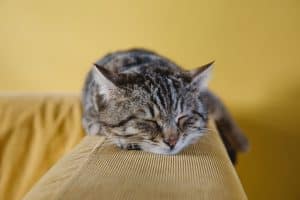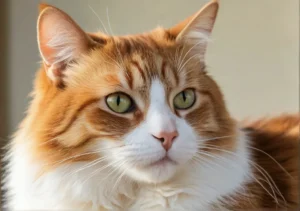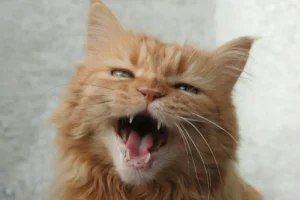Disclosure: We may earn a commission from helpful, relevant links in our content. No cost to you. See our privacy policy.
Ever spent a night gently lulled to sleep by the soft snores of your beloved kitty, only to be jolted awake by a sudden bout of meowing? You’re not alone – many pet parents share the puzzling experience of their cats’ nighttime chatter. So why do cats meow in their sleep sometimes?
However, deciphering the cryptic lullabies of a dreaming feline can be quite a challenge. In this post, we’ll take a journey into the secret world of cats’ nocturnal noises, helping you understand your furry friend’s midnight monologues better.
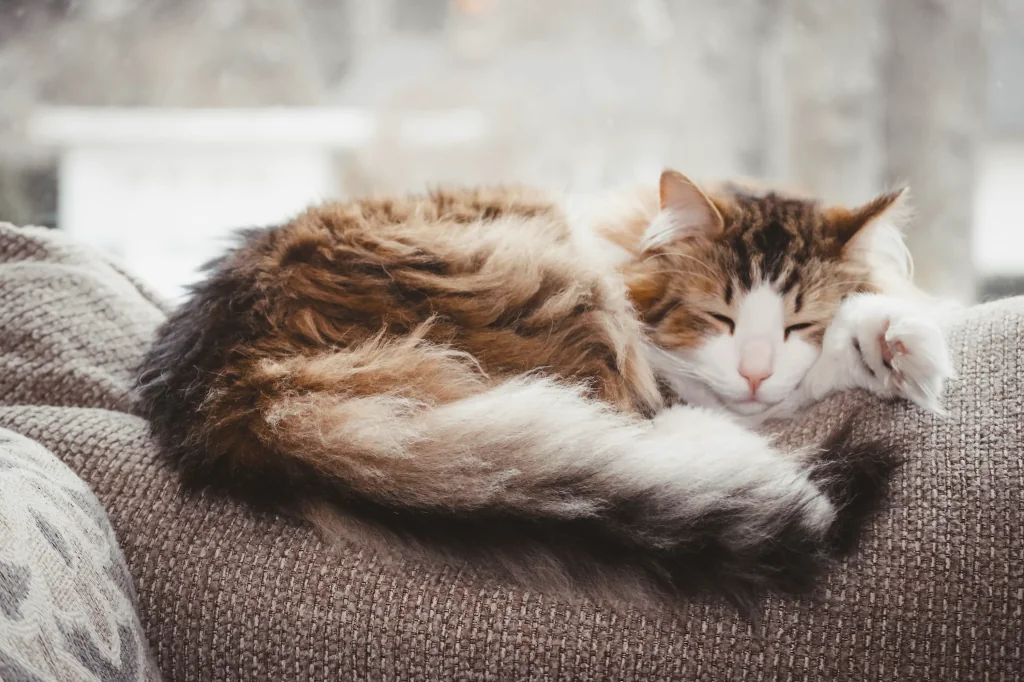
Why Do Cats Meow During Sleep?
Cats are known for their mysteriousness, and their sleep-time vocalizations only add to the intrigue.
Dream-Induced Meowing
Typically, cats meow during sleep because of dreams, similar to how humans may talk in their sleep. Just as our dreams may cause us to laugh, shout, or whimper, cats may emit a variety of sounds in response to their dream scenarios.
This behavior can be influenced by the cat’s daytime experiences, environment, and individual personality. Some cats might be naturally more vocal, expressing themselves in their wakeful hours and continuing the conversation even in their sleep!
So, when your cat starts to meow in the night, they might just be reliving their daytime adventures in their dreams.
Help your kitty have sweet dreams with a cozy cat bed, like the PetFusion Ultimate Cat & Dog Bed. Its memory foam base and bolsters provide superior comfort that your cat will love.
However, other factors also come into play.
External Triggers and Health Concerns
Cats, especially those with a heightened sense of hearing, might respond to environmental sounds even while asleep. A distant car horn, the neighbor’s dog barking, or even the hum of your refrigerator could trigger a sleepy meow from your feline friend.
Health issues could also be a factor. Cats with cognitive dysfunction syndrome, a condition similar to Alzheimer’s in humans, may vocalize more often, including during sleep. If your cat’s nighttime meowing is accompanied by other changes in behavior or appetite, a trip to the vet would be a smart move.
Suggested read: Cat Meowing Too Much – Solutions
Deciphering Different Cat Noises While Sleeping
Recognizing different cat noises can provide an intriguing glimpse into their dreams.
Let me take you back to a winter evening with my own feline friend, Smokey. As he was curled up on his favorite blanket, I noticed him making tiny, squeaky noises in his sleep. This was unusual for Smokey, a generally quiet and reserved cat.
A soft purr might signify a content dream, perhaps of basking in the warm sunshine or enjoying a feast of tuna. On the other hand, a sudden meow or hiss could suggest a more agitated dream – maybe of a surprise encounter with a pesky squirrel.
In Smokey’s case, the squeaks seemed to come when he was in deep sleep, twitching his whiskers and pawing the air. Given his playful nature, I couldn’t help but imagine him chasing after an elusive laser pointer in his dreams.
Our cats communicate in a variety of ways, even while sleeping. Here’s a handy table to help you understand your cat’s nocturnal noises:
| Cat Noises | Possible Interpretations |
|---|---|
| Soft purring | Contentment, possibly dreaming of pleasant experiences like a sunbath or a satisfying meal. |
| Sudden meow or hiss | Possible distress or agitation, possibly indicating a confrontational dream. |
| Squeaking or chattering | Often a response to dreams of hunting or excitement. |
| Growling | A rare sound during sleep, but could suggest discomfort or distress. |
| Silence | Deep sleep phase, usually a sign of comfort and relaxation. |
Each cat is unique, and these interpretations might not fit your cat exactly. The key is to observe your cat’s behavior patterns, both while they’re awake and during their sleep.
Over time, you may start to notice a correlation between their activities and their dream noises, offering you a better understanding of your feline companion’s subconscious world.
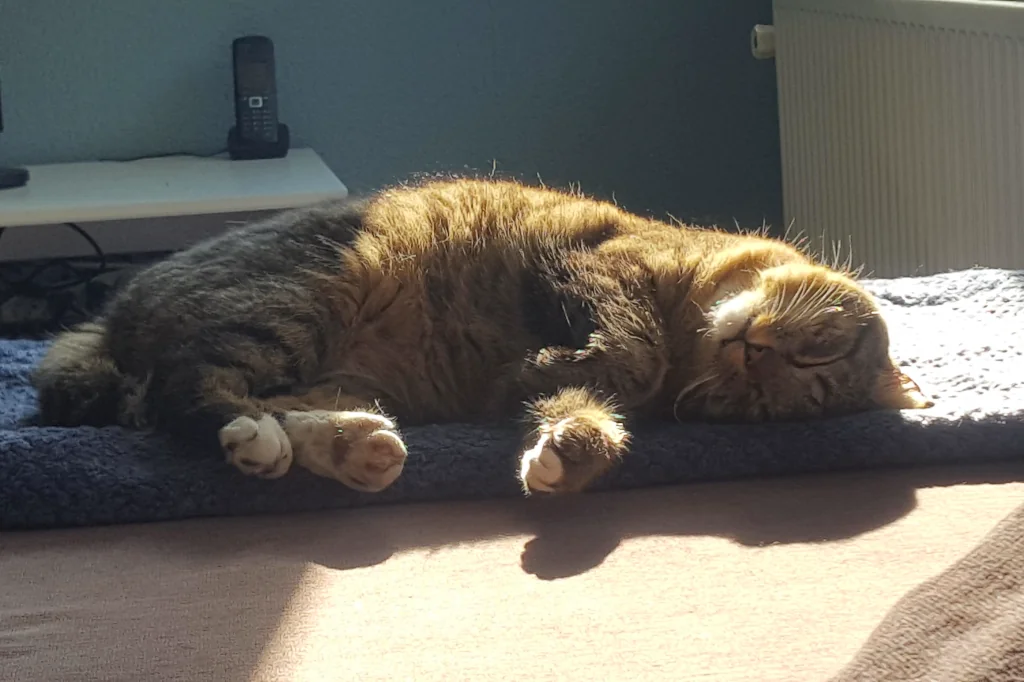
Understanding Cat Sleep Cycles
Much like humans, cats undergo various stages in their sleep cycle, oscillating between periods of deep sleep and lighter REM (Rapid Eye Movement) sleep. Learning about these cycles can help you understand some of your cat’s sleeping behaviors.
During the REM stage, you may notice your cat’s eyes moving beneath their lids, their whiskers twitching, or their paws making subtle movements. This is the stage when dreams occur in humans, and it’s likely the same for cats.
Meows or other sounds during this stage can often be attributed to the experiences they’re having in their dreams.
However, deep sleep in cats is often a quiet phase. You’ll notice your feline friend is in deep sleep when they’re completely relaxed, often stretched out and unresponsive to sounds or movements around them.
If your cat is particularly vocal in its sleep, observe when the meowing occurs. Does it coincide with the twitching whiskers and moving eyes of REM sleep? If so, it’s likely your cat is simply “talking” in their dreams.
Why Would a Cat Wake Up Meowing?
A cat waking up meowing can be caused by a few factors. In many cases, they might be communicating their needs to you. This could be a simple request for breakfast, a cry for attention, or even an expression of disorientation if they’ve just come out of deep sleep.
Elderly cats may be especially prone to this if they suffer from cognitive issues.
Your cat might also wake up meowing if they’re feeling uncomfortable or unwell. An abrupt change in the pattern of meowing, especially paired with other signs of distress, may indicate an underlying health issue.
If you notice this, it’s advisable to consult a vet to rule out any medical concerns.
In the end, your kitty’s vocal expressions are just one of the many ways they communicate their experiences, emotions, and needs. Paying attention to the context of their meowing – including the timing, frequency, and accompanying behaviors – can help you better understand and care for your feline friend.
Nightly Cat Noises: Should I Be Worried?
Rest assured, most nighttime noises from your cat are completely normal and a part of their sleep cycles.
Remember, just like us, our feline friends can have vivid dreams that elicit vocal reactions. However, being attuned to your cat’s normal behavior patterns will help you identify when something might be amiss.
It’s crucial to consider any changes in their routine or behavior. If the meowing or other noises are new or significantly more frequent, it might be time to pay attention. The same applies if the meowing is paired with other signs of distress, such as restlessness, changes in appetite, or unusual aggression.
If you’re interested in observing your cat’s behavior during sleep, consider investing in a pet monitoring camera. The Furbo Dog Camera works well for cats too, offering night vision and two-way audio so you can watch and listen to your cat during the night, and it may help you better understand their nocturnal noises.
In my years as a cat parent, I’ve found that understanding your cat’s unique behaviors and patterns can make all the difference in their well-being.
So, don’t panic at the first sound of a midnight meow. Instead, observe and understand – and if in doubt, a vet’s advice can provide invaluable peace of mind.
FAQs
Alex, a passionate animal lover, has experience in training and understanding animal behavior. As a proud pet parent to two dogs and three cats, he founded AnimalReport.net to share insights from animal experts and expand his knowledge of the animal kingdom.

